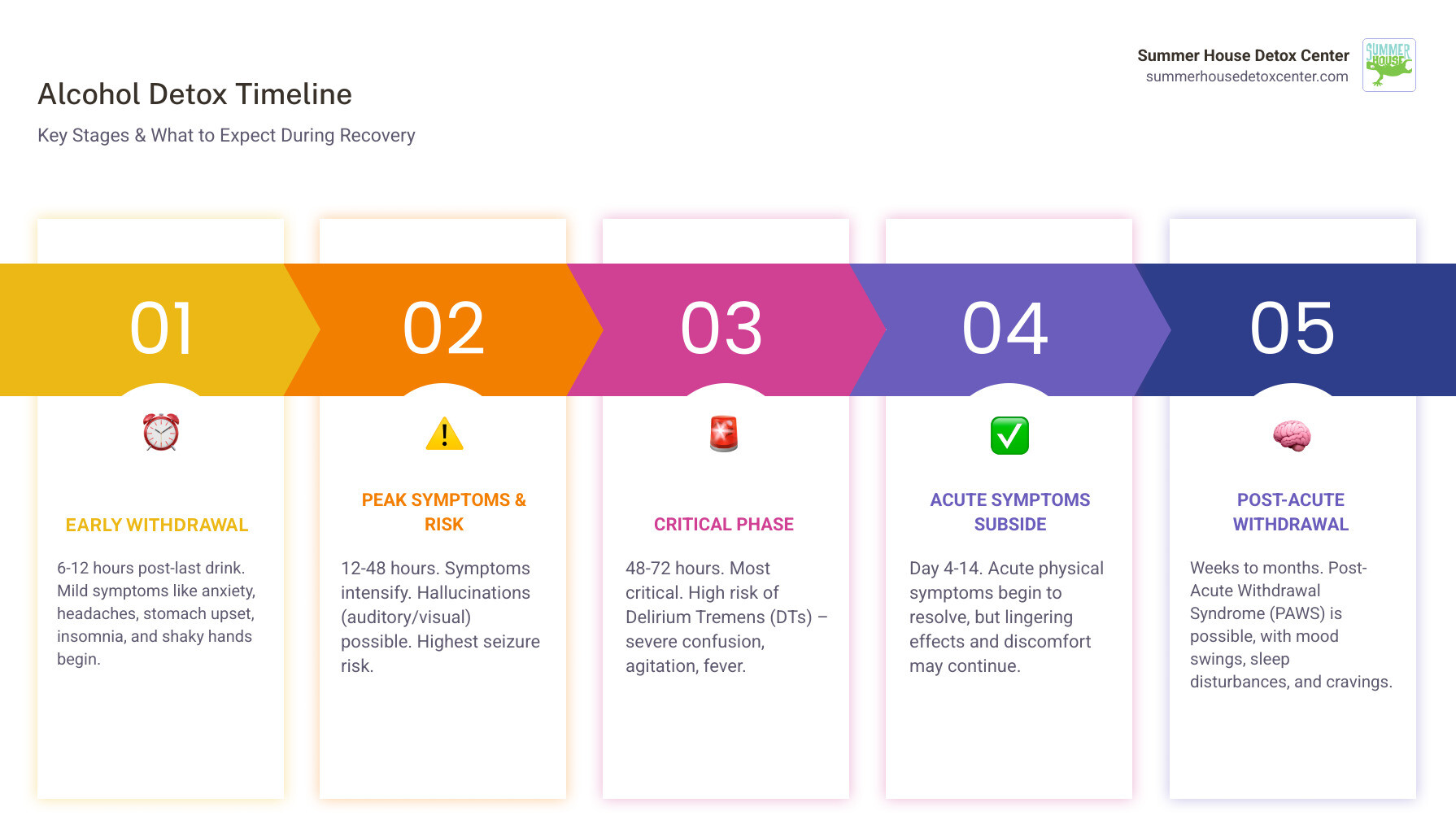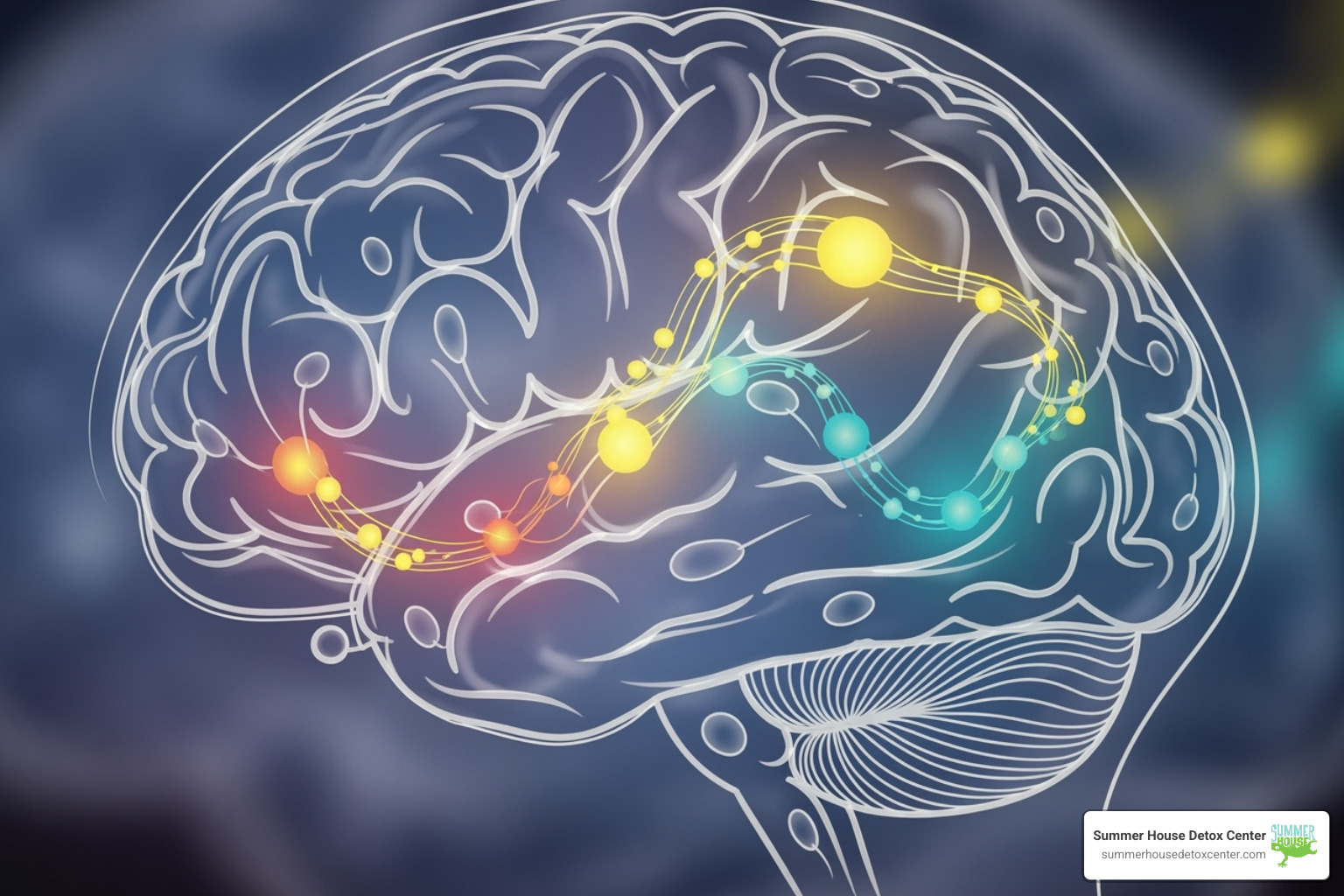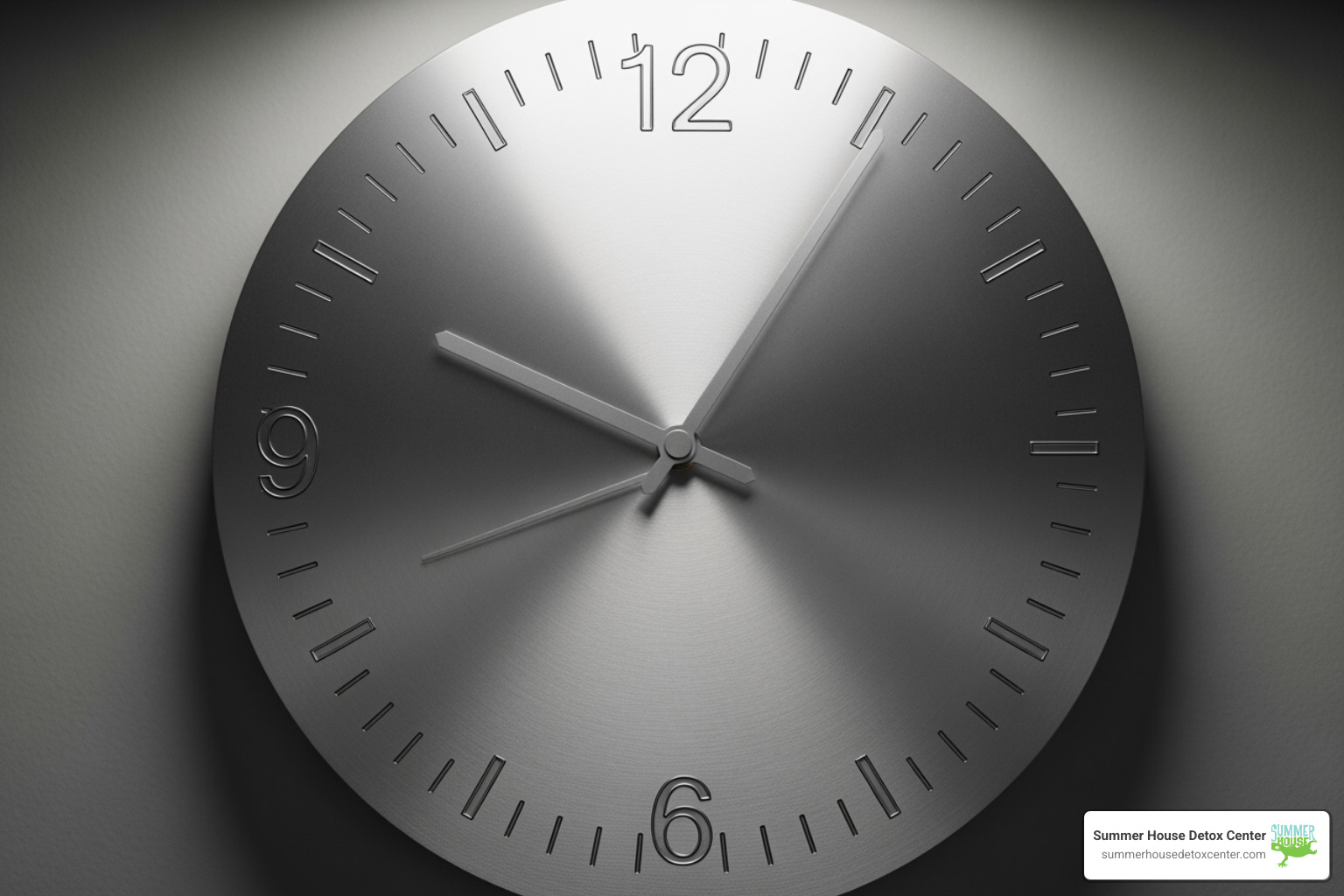Understanding the Alcohol Detox Timeline: What to Expect During Recovery
The alcohol detox timeline typically follows a predictable pattern, though individual experiences vary. Here’s what most people can expect:
Quick Timeline Overview:
- 6-12 hours: Early symptoms begin (anxiety, headaches, stomach upset)
- 12-48 hours: Symptoms peak, hallucinations possible, highest seizure risk
- 48-72 hours: Most critical phase, risk of delirium tremens (DTs)
- Day 4-14: Acute symptoms subside, lingering effects may continue
- Weeks to months: Post-acute withdrawal syndrome (PAWS) possible
For those with alcohol dependence in Miami, understanding this timeline can reduce fear about recovery. Alcohol withdrawal syndrome affects about 50% of people with alcohol use disorder who stop or reduce their drinking.
Withdrawal occurs because the brain, having adapted to alcohol’s depressant effects, becomes overactive when you stop drinking. This hyperexcitability causes the challenging and sometimes dangerous symptoms.
Why timing matters: Most people experience their worst symptoms between 24-72 hours after their last drink. This is when medical supervision becomes most critical, as severe complications like seizures and delirium tremens are most likely to occur.
The good news is that with medical care, withdrawal is manageable. Florida’s supportive recovery community offers an ideal environment to begin the journey toward lasting sobriety.

Alcohol detox timeline terms at a glance:
The Science Behind Alcohol Withdrawal
Understanding the science behind the alcohol detox timeline can help you feel more prepared for what’s ahead. Your brain adapts to alcohol’s constant presence.
Alcohol is a depressant that slows brain activity. Over time, your central nervous system (CNS) compensates for this effect to maintain balance.

This involves two key neurotransmitters: GABA (calming) and glutamate (stimulating). To counteract alcohol’s effects, your brain reduces GABA activity and increases glutamate.
When you stop drinking, the brain is left in a state of hyperexcitability. Without alcohol’s depressant effect, the nervous system goes into overdrive, causing withdrawal symptoms.
This is physical dependence: your body needs alcohol to prevent withdrawal. It’s a matter of brain chemistry, not willpower. This understanding shows why quitting “cold turkey” is risky and why medical supervision during detox in a Miami facility is essential for safety.
For a deeper dive into how alcohol impacts your brain, explore: Does Alcohol Addiction Change the Way the Brain Works?
Common Symptoms of Alcohol Withdrawal
As your brain rebalances, you may experience a range of temporary symptoms, which are manageable with proper care.
Common symptoms often begin within hours and can include anxiety, nervousness, persistent headaches, and insomnia. Physical symptoms progress to include nausea, vomiting, and tremors (“the shakes”). Cardiovascular responses include heart palpitations, increased heart rate, high blood pressure, and excessive sweating.
Other symptoms can include fatigue, mood swings, and difficulty concentrating. These signs indicate your body is under significant stress as it heals.
If you’re experiencing these signs, it’s crucial to consider professional help: Top 8 Signs You Need Alcohol Withdrawal Treatment
Risk Factors for Severe Withdrawal
While every alcohol detox timeline is unique, certain factors increase the risk of severe withdrawal, highlighting the need for medical supervision at a Miami facility like Summer House Detox Center.
- Drinking history is the biggest factor. A long history of heavy daily drinking or frequent binge drinking (5+ drinks for men, 4+ for women) increases withdrawal severity.
- Age is another factor. Older adults often have more severe symptoms and may have other health conditions that complicate detox.
- A history of severe withdrawal, including withdrawal seizures or delirium tremens (DTs), significantly increases the risk of recurrence.
- Co-occurring health conditions (e.g., liver or heart disease) and issues like dehydration or electrolyte imbalances also increase the danger.
In Florida’s climate, the risk of dehydration is higher, making medical supervision even more critical.
To learn more about binge drinking and its implications, visit: Is Binge Drinking a Sign of Alcohol Addiction?
The Complete Alcohol Detox Timeline: Stages and Symptoms
Understanding the alcohol detox timeline can ease fear for those facing withdrawal in Miami. While each journey is unique, the process follows a predictable pattern.
Your timeline depends on factors like drinking history, age, and overall health. Symptoms usually peak between 24 and 72 hours. For most, acute withdrawal lasts about five to seven days, though some effects can linger.

With medical support at a facility like Summer House Detox Center, this process is safe and manageable. Florida’s healing environment provides an ideal backdrop for recovery.
For more detailed information about timing, check out: Alcohol Detox: How Long Does It Take?
Stage 1 (6-12 Hours): Early Withdrawal
The alcohol detox timeline begins within 6 to 12 hours of the last drink. Early symptoms often resemble an intense hangover and include anxiety, headaches, nausea, insomnia, and shaky hands.
These are not just signs you need a drink; they are the first indications of your central nervous system recalibrating. These symptoms are an early warning. Seeking professional help at this stage is the most effective way to prevent escalation.
If you’re recognizing these signs in yourself or a loved one, this resource can help: Alcohol Withdrawal Signs: How to Know You Need Professional Alcohol Detox Treatment
Stage 2 (12-48 Hours): Peak Symptoms and Increased Risk
Between 12 and 48 hours into the alcohol detox timeline, symptoms intensify as your nervous system goes into overdrive. Early symptoms intensify significantly, with anxiety becoming severe and tremors spreading. Some people experience frightening hallucinations (visual, auditory, or tactile).
The cardiovascular system is also stressed, with potential spikes in blood pressure and heart rate, which is especially dangerous for those with underlying heart conditions.
Critically, this window carries the highest risk for seizures. These can occur suddenly, even without a prior history, due to the brain’s hyperexcited state.

This is why medical supervision is crucial. Professionals can monitor vitals, provide medication, and intervene to prevent dangerous complications.
To better understand what these critical early days involve: The First 72 Hours of Detox: What to Expect and How to Prepare
Stage 3 (48-72 Hours): The Most Critical Phase of the Alcohol Detox Timeline
The 48 to 72-hour mark of the alcohol detox timeline is the most critical phase. While some symptoms may improve, this is when the most serious complication, Delirium Tremens (DTs), can occur. DTs affects 5-15% of people in withdrawal and can be life-threatening without treatment.
DTs is a medical emergency characterized by severe confusion, disorientation, extreme agitation, high fevers, and profuse sweating. Associated symptoms include terrifying hallucinations, severe tremors, and dangerously high heart rate and blood pressure.
Without medical treatment, the mortality rate for DTs can be as high as 20%. Even with care, it is 1-4%, with deaths often caused by hyperthermia, heart issues, or seizures. The unpredictable nature of DTs makes detoxing alone extremely dangerous, especially for those with risk factors. In Miami’s climate, the risk of hyperthermia from DTs is even greater, making medically supervised facilities essential.
Learn more about the dangers of going it alone: The Importance of Medically Supervised Detox: Why DIY Detox Can Be Dangerous
Stage 4 (Day 4 to 2+ Weeks): The Path to Stability
After the critical 72-hour period of the alcohol detox timeline, the most dangerous phase is over, and your body begins to stabilize. By day four or five, most people feel significant improvement as intense physical symptoms fade.
However, some people experience Post-Acute Withdrawal Syndrome (PAWS), where symptoms persist after acute withdrawal resolves within one to two weeks. PAWS symptoms can include mood swings, sleep disturbances, and “brain fog” (difficulty concentrating). Challenging cravings can also resurface weeks or months later.
The good news is that PAWS is temporary. This is when the real work of recovery begins: building new coping skills and addressing underlying issues to create a sober life. Florida’s supportive recovery community and climate offer an excellent environment for this phase of healing.
For comprehensive information about the next steps in your journey: What Happens After Alcohol Detox?
Treatment and Long-Term Recovery in Florida
Completing the alcohol detox timeline is a brave first step, but detox alone isn’t enough for lasting sobriety. Comprehensive treatment and long-term planning are essential.
In Miami, Florida, medical detox at Summer House Detox Center is the launching pad for recovery. We provide a safe, comfortable environment to manage withdrawal and help you rebuild your life. Florida’s supportive environment helps in healing. After detox, you can focus on the deeper work of recovery, like addressing underlying issues and building healthy coping strategies.
Our inpatient treatment programs are personalized to your needs. The goal is to help you build a fulfilling, alcohol-free life.

Find why medical detox is so vital: Why Medical Detox Is a Vital First Step in Recovery
Medications and Supportive Care Used in Alcohol Detox
During the alcohol detox timeline, medical support is a lifesaver. At Summer House Detox Center, our team uses proven medications and supportive care to ensure your safety and comfort.
The cornerstone of safe detox is benzodiazepines (e.g., Valium, Ativan), prescribed by our medical team. They calm the overexcited nervous system, preventing complications like seizures and helping the brain transition safely. Our doctors personalize medication plans, carefully monitoring and adjusting dosages based on your response.
We also provide seizure prevention, symptom management (for nausea, anxiety, etc.), and crucial nutritional support. Alcohol depletes essential vitamins (like B vitamins) that the brain needs to heal. Restoring hydration with IV fluids and replenishing vitamins significantly improves physical comfort and mental clarity. Our 24/7 medical monitoring makes supervised detox far safer than attempting it alone.
To learn more about the medications used in treatment, visit: What Type of Medications Are Used in Alcohol Treatment?
The Role of Support in Lasting Sobriety
After the alcohol detox timeline, the journey continues. Lasting sobriety is built on a foundation of support, new skills, and meaningful connections.
Key components of recovery include:
- Individual therapy to uncover triggers
- Group therapy for peer connection
- Family support to heal relationships
Miami and South Florida have active support groups like AA and SMART Recovery, which provide invaluable peer support and accountability. We create a personalized aftercare plan before you leave, providing a roadmap for continued recovery with therapy, support groups, and other resources. We also encourage holistic approaches like mindfulness, meditation, and exercise as practical tools for managing stress and supporting sobriety.
For more insights on building a strong foundation post-detox, check out: Life After Detox: Building a Strong Foundation for Long-Term Sobriety
How Alcohol Withdrawal Differs for Men and Women
The alcohol detox timeline can differ for men and women due to biological differences, which we consider to provide personalized care.
- Metabolism: Women typically have less body water and lower levels of the enzyme that breaks down alcohol. This can lead to higher blood alcohol levels, faster dependence, and more intense withdrawal.
- Body composition: Women’s higher body fat percentage means alcohol is more concentrated in their systems, making withdrawal more challenging.
- Hormonal factors: Hormonal fluctuations in women can influence alcohol’s effects and withdrawal severity.
- Health risks: Women face higher risks of liver disease, heart problems, and certain cancers from alcohol, even at lower consumption levels.
At Summer House Detox Center, our personalized plans account for these gender-specific factors to ensure everyone receives care custom to their needs.
For insights into specific populations and their needs: Why Do Veterans Have a High Need for Alcohol Treatment?
Frequently Asked Questions about the Alcohol Detox Timeline
It’s natural to have questions about the alcohol detox timeline. Here, the team at Summer House Detox Center in Miami answers some common concerns from people across Florida.
How long does alcohol withdrawal typically last?
The duration of the alcohol detox timeline varies, but general patterns can help set expectations. Acute withdrawal symptoms usually peak at 24 to 72 hours and then begin to improve. Most physical symptoms resolve within 5 to 7 days.
However, some experience Post-Acute Withdrawal Syndrome (PAWS), with lingering symptoms like mood swings, sleep issues, anxiety, and cravings that can last for weeks or months and fluctuate in intensity. The good news is that PAWS is temporary and manageable with proper support.
For a detailed look at what happens during extended sobriety, explore: Alcohol Abstinence Timeline
Can alcohol withdrawal be prevented?
The only way to completely prevent alcohol withdrawal is to avoid developing physical dependence. Seeking help early is key. If you drink heavily, early intervention can prevent more severe dependence.
For those already physically dependent, quitting “cold turkey” is not recommended. Tapering should only be done under medical supervision. The safest way to prevent severe complications like seizures or DTs is through medically supervised detox. At Summer House Detox Center, our team can safely manage your symptoms. Florida’s supportive environment and our experienced staff provide the ideal conditions for a safe and comfortable detox.
Learn more about the importance of professional care: Why You Should Choose Alcohol Detox at Rehab vs. at Home Detox
What are the long-term benefits of quitting alcohol?
While the alcohol detox timeline is challenging, the long-term benefits of quitting alcohol are life-changing.
- Improved Physical Health: Your liver begins to heal, blood pressure stabilizes, heart health improves, and your immune system strengthens.
- Better Mental Health: Expect clearer thinking, improved memory, and better concentration. Anxiety and depression often decrease, leading to more stable moods.
- Restored Relationships: Sobriety provides the opportunity to rebuild trust and improve communication with loved ones.
- Financial Savings: You’ll save a substantial amount of money that was previously spent on alcohol.
- Improved Sleep: After the initial withdrawal, you can expect more restful and restorative sleep.
- Increased Energy: Sobriety brings increased energy and vitality to engage fully with life.
The journey through detox is a worthwhile investment in a longer, healthier, and more fulfilling life.
Find more about these life-changing benefits: 7 Amazing Ways Your Life Will Change After Alcohol Rehab
Begin Your Recovery Journey in Miami
The alcohol detox timeline is a journey you don’t have to face alone. As we’ve seen, withdrawal progresses through predictable stages, with the 48-72 hour window being the most critical. Attempting detox without professional support can be dangerous.
In Miami, Florida, a supportive recovery community awaits. Summer House Detox Center provides a safe, comfortable path to sobriety in this healing environment.
What sets us apart is our combination of medical expertise—including 24/7 monitoring and personalized medication—and genuine empathy. Many of our staff have personal experience with recovery, so we understand your journey.
We know taking the first step is overwhelming. It’s normal to feel worried about withdrawal, and we are here to help. Our personalized approach ensures your detox plan is custom to your specific needs, keeping you safe and comfortable regardless of your drinking history.
Recovery is about building a new life. In Miami’s supportive environment, that new life is within your reach. You deserve dignity, comfort, and a team that believes in your ability to heal.
Find our specialized alcohol detox services: Detox Services: Alcohol Detox
